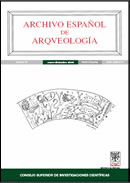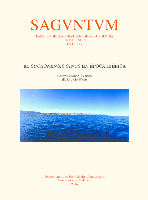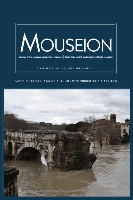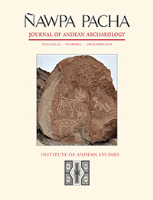
Lucentum
Scope & Guideline
Connecting Cultures through Research
Introduction
Aims and Scopes
- Archaeological Discoveries and Interpretations:
The journal publishes findings from archaeological excavations and analyses of artifacts, contributing new interpretations and contextual understanding of historical sites. - Epigraphy and Inscriptions:
A significant focus on the study of ancient inscriptions, offering insights into the social, political, and cultural aspects of past civilizations through their written records. - Cultural and Ritual Practices:
Research on the rituals, religious practices, and daily life of ancient peoples, particularly in the context of the Iberian Peninsula, highlighting cultural continuity and change. - Material Culture Analysis:
Investigations into pottery, tools, and other material remains, employing various methodologies including typological classification and chemical analysis to understand production and usage. - Interdisciplinary Approaches:
The journal encourages interdisciplinary research, integrating methodologies from archaeology, anthropology, history, and art history to provide a holistic understanding of ancient societies.
Trending and Emerging
- Environmental Archaeology:
There is an increasing focus on the relationship between ancient peoples and their environments, including studies on landscape changes, resource management, and the impacts of climate on cultural practices. - Ritual and Religious Practices:
Emerging themes surrounding the analysis of ritual practices and their implications for understanding social structures and beliefs in ancient societies are becoming more prevalent. - Technological Applications in Archaeology:
The use of advanced technologies such as drones for surveying and non-destructive analysis of artifacts is gaining popularity, reflecting a trend towards innovative methodologies in archaeological research. - Intercultural Interactions and Influences:
Research exploring interactions between different cultures, including trade, migration, and cultural exchange, is on the rise, highlighting the interconnectedness of ancient societies.
Declining or Waning
- Late Roman and Early Medieval Studies:
Research focusing specifically on the Late Roman and early medieval periods has seen a decrease, possibly due to a shift towards earlier periods and the exploration of more localized archaeological contexts. - Military Archaeology:
Papers specifically addressing Roman military presence and activities are less frequent, indicating a potential waning interest in this topic or a broader focus on civilian life and societal structures. - Art Historical Perspectives:
The analysis of ancient art and its contexts, while still relevant, appears to be receiving less attention compared to archaeological findings and material culture studies.
Similar Journals

Archivo Espanol de Arqueologia
Discovering the past, shaping the future of archaeology.Archivo Español de Arqueología is a prestigious journal published by the Consejo Superior de Investigaciones Científicas (CSIC), dedicated to the field of archaeology and the historical sciences. Since its transition to Open Access in 1991, this journal has been a significant resource for scholars and practitioners in Spain and beyond, ensuring the dissemination of high-quality research to a broad audience. With an impressive Scopus ranking that places it within the top 20% of journals in the disciplines of History and Archaeology, Archivo Español de Arqueología plays a crucial role in advancing academic discourse and promoting innovative archaeological methodologies. The journal has maintained rigorous standards, reflected in its placement within the Q2 and Q3 quartiles, enabling it to establish a reputation for excellence and reliability in archaeological scholarship. Researchers, professionals, and students are encouraged to explore the journal's diverse array of articles from its foundation year of 2009 to the present, enriching their understanding of the past through the latest findings and theoretical advancements in archaeology.

Conimbriga-Revista de Arqueologia
Exploring the Depths of Portugal's Archaeological HeritageConimbriga-Revista de Arqueologia is a distinguished open-access journal dedicated to the field of archaeology, published by COIMBRA UNIVERSITY PRESS. Since its inception, the journal has fostered a vibrant intellectual community focused on the exploration and dissemination of archaeological research, particularly emphasizing studies relevant to the rich historical and cultural heritage of Portugal and beyond. With its open access model established in 2014, it has become a vital resource for researchers, professionals, and students to share their findings without access barriers, encouraging collaboration and knowledge exchange. Despite the absence of specific metrics such as the HIndex and Scopus rankings, the journal is recognized for its commitment to high-quality scholarship and its role in advancing archaeological discourse. Positioned within the scholarly landscape, Conimbriga-Revista de Arqueologia serves as a crucial platform for the publication of innovative research, reviews, and critical essays, making it an essential journal for those invested in the archaeological sciences.

Journal of Ancient History and Archaeology
Advancing Knowledge in Ancient History and ArchaeologyJournal of Ancient History and Archaeology is a premier, open-access academic journal published by MEGA PUBLISHING HOUSE since 2014, dedicated to exploring the rich tapestry of ancient civilizations and archaeological discoveries. With ISSN 2360-266X, this journal has made significant strides in the field, achieving elevated rankings across multiple categories, including Q1 in Classics and Q2 in History as of 2023. Positioned in Romania, the journal serves an international audience of researchers, professionals, and students who seek to disseminate and access influential scholarship in ancient history and archaeology. As a prominent resource within the Scopus rankings, it reflects a robust commitment to advancing knowledge through quality research, making it a vital platform for the sharing and discussion of innovative ideas and methodologies. The journal covers a wide array of topics related to ancient societies, enhancing our understanding of their cultural, historical, and archaeological significance.

SAGVNTVM-Papeles del Laboratorio de Arqueologia de Valencia
Unlocking the Past: Where Archaeology Meets Innovation.SAGVNTVM-Papeles del Laboratorio de Arqueologia de Valencia is an esteemed open-access journal dedicated to advancing the field of archaeology, published by the Department of Prehistory and Archaeology at the University of Valencia, Spain. With an ISSN of 0210-3729 and an E-ISSN of 2174-517X, the journal has been a vital resource for scholars since its inception in 1962, ensuring that high-quality archaeological research is readily available to the global academic community. Notably, it holds a distinguished Q2 ranking in both Archeology and Archeology within the arts and humanities categories as of 2023, reflecting its commitment to rigorous scholarship and significant contributions to the field. The journals' Scopus rankings further affirm its relevance, positioned at #188 of 413 in Arts and Humanities and #179 of 354 in Social Sciences. Researchers and professionals alike can delve into a variety of topics, benefiting from the journal’s rich archive from 2017 to 2023. With a mission to disseminate knowledge and foster dialogue in archaeology, SAGVNTVM serves as an essential platform for investigators, students, and practitioners interested in the latest archaeological findings and methodologies.

Palaeohispanica-Revista sobre Lenguas y Culturas de la Hispania Antigua
Exploring the Linguistic Tapestry of Ancient HispaniaPalaeohispanica-Revista sobre Lenguas y Culturas de la Hispania Antigua is a distinguished academic journal dedicated to the study of ancient Spanish languages and cultures. Published by the INST FERNANDO CATOLICO in Spain, this journal serves as an essential platform for scholars and researchers exploring the rich historical and linguistic heritage of Iberia. With a specific focus on the intersections of archaeology, history, linguistics, and cultural studies, Palaeohispanica has garnered substantial recognition, reflecting its commitment to high-quality research as evidenced by its rankings in prominent Scopus categories, reaching the 80th percentile in History and the 69th in Archaeology. While the journal operates without an Open Access option, it continues to contribute significantly to the academic discourse surrounding ancient Hispania from 2019 to 2023, ensuring that vital research is accessible to a discerning audience. As a Q3 and Q2 ranked publication in various relevant categories, it is an invaluable resource for professionals, researchers, and students eager to delve into the complexities of ancient languages and cultures.

Rivista Storica Dell Antichita
Exploring the Depths of AntiquityRivista Storica Dell Antichita is a distinguished academic journal published by PATRON EDITORE S R L, dedicated to advancing knowledge in the fields of Archaeology, Classics, and History. With an ISSN of 0300-340X, this journal serves as a crucial platform for scholars and researchers who seek to delve into the rich historical narratives of antiquity. Although it has discontinued its coverage in Scopus after 2021, its legacy reflects a commitment to fostering scholarly dialogue within the academic community, evident from its rankings in notable Scopus categories, including Q3 in Classics and Q4 in Archaeology and History. Additionally, Rivista Storica Dell Antichita boasts a substantial readership in Italy, contributing to the understanding of historical contexts and methodologies. As scholars engage with its authentic research articles, they will find in this journal a valuable resource that not only enhances academic discourse but also inspires future explorations into the ancient world.

Mouseion-Journal of the Classical Association of Canada
Where classical inquiry meets modern discourse.Mouseion - Journal of the Classical Association of Canada, published by University of Toronto Press Inc, stands as a vital academic resource in the fields of Classics and Archaeology. With a focus on promoting scholarly discourse, this journal provides a platform for original research, critical reviews, and interdisciplinary studies that engage with ancient cultures and their legacies. Since its convergence in 2019, Mouseion has quickly established itself within the academic community, achieving a commendable Q1 ranking in Classics and Q2 in both Archaeology categories in 2023, showcasing its commitment to excellence. While not an open-access journal, it is positioned among the top 29% of classics journals, reflecting its impact and the quality of publications. Nestled within Canada, this journal addresses a global audience of researchers, professionals, and students dedicated to the exploration of the classical world, and it endeavors to contribute significantly to the scholarly understanding of cultural heritage.

Deltion of the Christian Archaeological Society
Uncovering the Past, Shaping the Future of Christian ArchaeologyDeltion of the Christian Archaeological Society (ISSN: 1105-5758, E-ISSN: 2241-2190), published by the Christian Archaeological Society in Athens, Greece, stands as a pivotal source of scholarly work within the realm of Christian archaeology. This journal is dedicated to disseminating high-quality research that promotes the understanding of Christian history, heritage, and archaeological practices. Though it operates under traditional access options, it provides a comprehensive platform for researchers and professionals alike, fostering dialogue and collaboration within the archaeological community. With a commitment to advancing knowledge, the Deltion aims to support both established scholars and emerging voices, reinforcing the significance of archaeology in interpreting religious narratives and cultural contexts. Researchers, students, and professionals interested in the intersections of archaeology, history, and theology will find this journal an invaluable resource in their scholarly pursuits.

Complutum
Where History Meets Archeological InsightComplutum, published by the Universidad Complutense de Madrid, serves as a leading academic journal in the fields of Archeology and History. With a notable track record since its inception and a convergence stretching from 2011 to 2024, the journal has established itself as a pivotal platform for scholarly discourse in these disciplines. Recognized in 2023 with a Q2 ranking in Archeology and Arts and Humanities, as well as a Q1 ranking in History, Complutum demonstrates its commitment to quality research, attracting contributions from leading experts and emerging scholars alike. The journal's impact is further evidenced by its competitive ranks within various Scopus categories, particularly its placement in the 77th percentile for History and 64th for Archeology. As a printed publication without open access options, Complutum caters to a specialized audience, providing a forum for in-depth analysis and discussion on archaeological findings and historical interpretations. Researchers, professionals, and students engaged in these fields will find Complutum an invaluable resource for advancing knowledge and fostering academic collaboration.

Nawpa Pacha
Pioneering Insights into Archaeological Practices.Nawpa Pacha, a prestigious journal published by Taylor & Francis Ltd, stands as a significant platform for advancing research in Archaeology within the fields of Arts and Humanities. Since its inception in 2019, it has rapidly established itself with an impressive impact, evidenced by its categorization in the Q1 quartile for Archaeology and its significant rankings—placing it at Rank #88 in the Arts and Humanities category and Rank #86 in the Social Sciences. Published in the United Kingdom, the journal aims to foster interdisciplinary dialogue and promote scholarly work that contributes to the understanding of archaeological heritage and practices. Researchers, professionals, and students alike will find this journal indispensable for disseminating innovative methodologies, theoretical frameworks, and case studies that push the boundaries of archaeological inquiry. Whether seeking to explore historical narratives or contemporary archaeological challenges, Nawpa Pacha serves as a vital resource in the ever-evolving landscape of archaeological research.